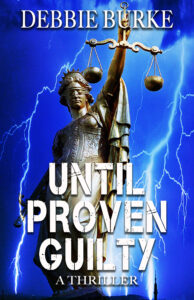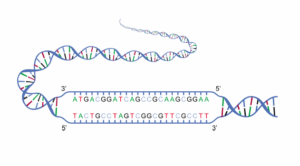by Debbie Burke
While waiting in line at a Walmart pharmacy a few days ago, I noticed a display rack of at-home DIY tests. It contained tests for Covid; Flu A and B; alcohol (urine strips); handheld breathalyzers (as low as $8); drug kits that test urine for marijuana, opiates, cocaine, amphetamines, meth, Oxycodone, PCP, Ecstasy, etc.—results in only five minutes!
Wow, I had no idea consumer test kits had gotten so comprehensive, sophisticated, and cheap.
Waiting in line can be boring…unless you’re a crime writer. My imagination took off with scenarios where drug and alcohol tests could add conflict and suspense to a story.
“You’re too drunk to drive.”
“I’m just fine, honeybunch.”
“Oh yeah? Blow into this.”
“Where the hell did you get that?”
“At Walmart.”
“No way.”
“Yes way. Now blow.”
But the most surprising kit was a home paternity test.
For only $15, is it really possible to determine whether or not a man is a child’s father?
Yes, but an additional $100 (approx.) must be paid to a DNA testing lab.
The kit includes what’s needed to collect cheek swabs from the alleged father(s) and child, and a mailer to send samples to a DNA lab. Results are ready in 1-2 business days and are available online or by mail. If several men could be the father, some kits allow testing of multiple subjects at the same time.
Home test results are reportedly 99.999999% accurate but are not admissible in court. According to Patermitylab.com:
While the science behind our Home DNA Test Kits are the exact same as the Legal Paternity Tests and Immigration Paternity Tests collected for in a laboratory, they cannot be used in court. This is because the Legal and Immigration Paternity Tests require you to go into a laboratory and have your samples collected. This is to establish what is legally referred to as a “chain of custody.” This is where a third party laboratory technician will verify the identification of the testors and then take their samples before submitting them for genetic testing.
Paternity tests can also eliminate a man as the father with the results showing 0% chance of paternity.
Reasons to determine the father’s identity include:
Establish a child’s legal status;
Obligation to pay child support;
Rights of visitation or custody;
A child’s eligibility for insurance benefits;
The right to inherit;
Medical history; genetic markers play a role in health conditions or predisposition to certain diseases.
Celebrities have long been targets in paternity cases.
Michael Jackson wrote the 1981 hit song “Billie Jean” where the narrator describes a brief encounter with a woman who later claims a child is his. Her proof is “a photo of a baby, cryin’, his eyes were like mine.” But the refrain protests, “the kid is not my son.”
Per Wikipedia, Jackson said:
There never was a real Billie Jean. The girl in the song is a composite of people my brothers have been plagued with over the years. I could never understand how these girls could say they were carrying someone’s child when it wasn’t true.
One particularly ardent fan claimed Jackson fathered her child. She sent him letters, proposing he kill himself at the same time she killed herself and “their” baby so they could all be together. She was later sent to a psychiatric hospital.
When fame and money are involved, even scientific proof does not prevent accusations and sensational trials. More famous cases:

Charlie Chaplin – Public domain
Charlie Chaplin was accused of fathering a child with a young starlet. After an arduous trial that featured an adorable toddler playing pattycake at the prosecution table, blood tests confirmed Chaplin was not the father.

Eddie Murphy
Photo credit: Wikimedia CC-BY-3.0
Eddie Murphy was taken to court by Spice Girl Melanie Brown to establish paternity of her daughter Angel. DNA proved Murphy was the father and therefore financially responsible.

Keanu Reeves
Photo credit: Governo do Estado de São Paulo, CC BY 2.0 <https://creativecommons.org/licenses/by/2.0>, via Wikimedia Commons
Keanu Reeves was sued for millions in spousal and child support by a woman whom he said he’d never met. The case was dismissed when DNA tests proved he was not the father.
All sorts of fictional scenarios spring to mind that deal with questionable paternity including false accusations, blackmail, sexual assault, gang rape, buried family secrets, disputed custody of the child, and more.
What if a child’s immigration status depends on who the father is?
What if character always believed their father was one man but he turns out to be a different man?
What if a stranger shows up claiming a character is his father?
What if an inheritance depends on a person being the benefactor’s natural child? If they’re not, then who inherits?
In real life, a person can refuse to take a DNA test. However, courts may order DNA tests. Since it is illegal to refuse a court order, refusal may subject the person to fines, penalties, and even jail time.
For this crime author, the seemingly mundane act of waiting in line at Walmart led to all sorts of story ideas. By the time I finally got to the service window, I had a list of questions to research when I got home.
The answers became today’s post.
~~~
TKZers: Have you written a story featuring a paternity theme? If so, what inspired the idea? What books have you read where paternity plays a role?
~~~
 When a rapist is set free because of contaminated DNA evidence, investigator Tawny Lindholm is outraged. How could her husband, attorney Tillman Rosenbaum, defend an obviously guilty man? Tawny’s world is further shaken when a stranger shows up, claiming to be the son of her beloved late husband. As cherished memories shatter, can her new marriage survive?
When a rapist is set free because of contaminated DNA evidence, investigator Tawny Lindholm is outraged. How could her husband, attorney Tillman Rosenbaum, defend an obviously guilty man? Tawny’s world is further shaken when a stranger shows up, claiming to be the son of her beloved late husband. As cherished memories shatter, can her new marriage survive?
Bestthrillers.com calls Until Proven Guilty: “One of the year’s top crime thrillers.”



